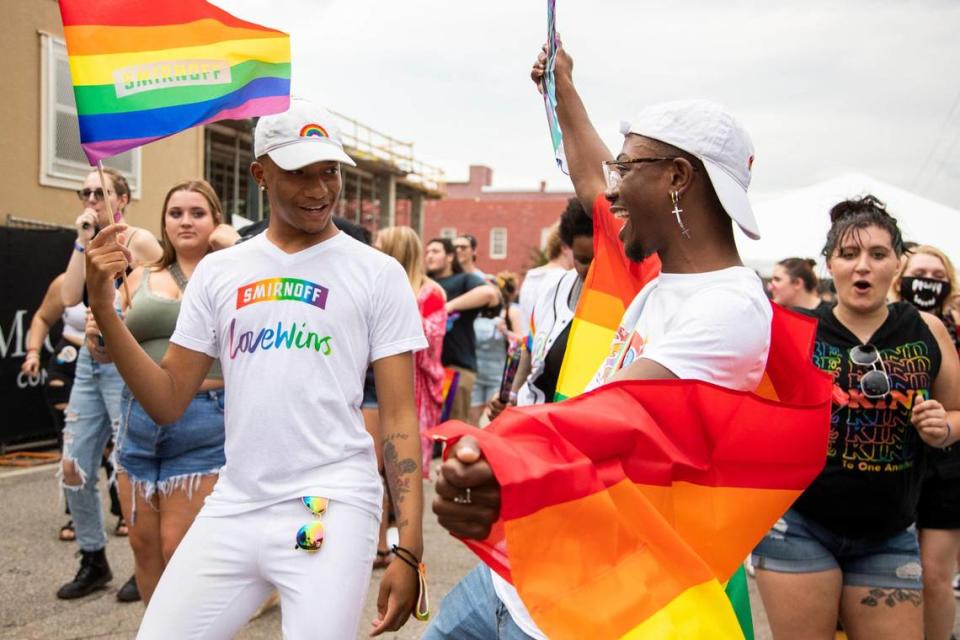Column: How Pride helped me find a home in South Carolina
Attending OutFest was the first moment I felt at home in South Carolina.
Walking up, I could hear the pop music, the shouts of joy. I’d been to queer festivals many times before, in three different cities. I knew this one wouldn’t be astronomically different.
But, when I laid eyes upon the throngs of people draped in rainbow flags, glistening with glitter and holding hands with same-sex partners, I couldn’t stop smiling. I rarely cry, but this almost brought me to tears.
I moved here 10 months ago from Texas, another part of the South, where being queer isn’t as easy as it would be as New York City or San Francisco, but the cities there are much bigger. There’s a lot more openly queer people. Where the big cities in South Carolina have one to two gay bars, the cities in Texas had six to seven.
I moved to Myrtle Beach during the pandemic. It wasn’t like college. I couldn’t go to class to meet new friends, to meet other queer people. I felt weird about dating apps. I didn’t want to risk getting COVID-19, and the thought of being pen pals indefinitely with someone just a few miles away didn’t feel exciting either. That meant bars weren’t an option, either.
My first exposure to the queer community in South Carolina was when I wrote a story earlier this year about Pulse Ultra Club. I wanted to know how a nightclub survives when everything about COVID-19 makes going out drinking and dancing dangerous.
I went to Pulse two Fridays in a row, with a mask on, to see what it was like. I talked to customers, getting to know about their lives and why they would risk COVID-19 by going to a bar.
But LGBTQ+ bars aren’t just “bars.” They are gathering places for our community. They are where we go to find each other, flirt with each other and make new friends. Queer spaces are where we go from being the minority to being the norm.
The people who went to Pulse during COVID-19 were faced with a cruel decision: stay home and protect themselves and others from a deadly virus, or go out and feel like a real human being again, go out and feel less alone. They chose the latter. Many of us grew up feeling alone as we figured out our identities. No one wants to feel that way again.
When I left Pulse on those two weekends, I felt emotional. Being there, I was reminded of all that I had been missing. I hadn’t set foot in a gay bar or gone dancing with my queer friends in months, and I didn’t know when I would again.
I’ve been fully out for years, and I never hide my sexuality. I don’t “tell” people I’m gay. They just figure it out when I talk about dating men. When I Ieft Pulse, my heart hurt because I didn’t know when I would again be in a space where I was the norm.
Queer spaces are so important because they are where we are truly safe. Once I was fully vaccinated, the first time I went back out to a late-night bar in Myrtle Beach, it wasn’t a gay bar, and I immediately knew I wasn’t as safe.
As I stood in line for the bathroom, I heard someone call two men “faggots” in an aggressive manner. I immediately tensed up, clutched my drink a little tighter and thanked myself for asking a friend to wait outside until I got out. I didn’t go more than 10 feet from my friends for the rest of the night.
I still haven’t been back to that bar. I don’t plan to return.
Several weeks later, I would ask to go to Columbia to cover OutFest, the summertime bash put on by South Carolina Pride. It was one of the first Pride events in the state since the pandemic began.
I’d been back to Pulse long before attending OutFest. But something was different when I walked onto Park Street in Columbia. It took me a while to figure out what.
Daylight.
For so many, growing up queer means growing up in the shadows. My family accepted me when I came out at 17. But I didn’t really know any queer people until I came out myself. I figured out my sexuality because I’d spent enough time staring at boys, even when dating girls, that there had to be something going on.
I often came back to two questions when attending OutFest and preparing my upcoming series of stories about Pride and the queer community. What if I had attended Pride or been exposed to queer role models when I was younger? Would I have come out sooner, had less heartache throughout the process?
Seeing queer people out in the daylight proud and unafraid of who they are is nothing less than magical. That’s what I felt at OutFest. In my time in Myrtle Beach, I have seen three total same-sex couples outdoors, in public.
Most of the time when I do see queer people in public, it’s in the dark, at Pulse or down the street at St. George, another gay bar. We aren’t hiding, but we aren’t shining, either.
Daylight isn’t exclusive to Columbia. In October, Myrtle Beach will see daylight, as well, when it hosts its own Pride celebration. Even sooner, our local Pride organization is hosting a picnic at the end of June, also out in the sun.
Daylight can be found anywhere, but daylight is one of the most powerful parts of Pride.
Pride gives us the courage to shed our fears, even for a few hours, and step out into the sun as our truest selves.

 Yahoo Movies
Yahoo Movies 

